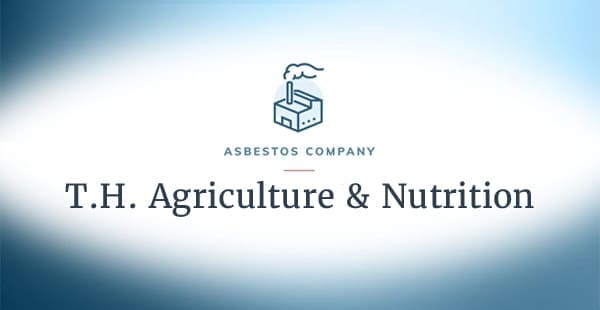T H Agriculture & Nutrition, L.L.C. History of Asbestos Use
T H Agriculture & Nutrition was incorporated in 1917 in Missouri as Thompson, Munro and Robins Chemical Company, named after its three founders. Disagreements between the founders led to multiple ownership and name changes during the company’s early years.
By 1923, Charles T. Thompson was the only original founder still involved. The company name was subsequently changed to Thompson-Hayward Chemical Company. In 1931, the company opened a chemical factory in New Orleans, Louisiana. This factory manufactured dry and wet pesticides in the 1940s, expanding into herbicides in the 1950s.
Beginning on April 1, 1960, the company distributed various grades of raw chrysotile asbestos fibers around the United States. Thompson-Hayward Chemical Company partnered with Carey-Canadian Mines, Ltd for this new venture.
Carey-Canadian Mines, Ltd was a subsidiary of Celotex Corporation, a Delaware-based manufacturer of construction products. Carey-Canadian Mines, Ltd. mined the asbestos, while Thompson-Hayward Chemical Company distributed the mineral.
Records show Carey-Canadian Mines shipped asbestos to at least 15 sites operated by Thompson-Hayward Chemical Company. From there, the company distributed the fibers across the United States to other asbestos companies.
The company distributed asbestos throughout the U.S., with locations in Alabama, Colorado, Indiana, Tennessee and others.
Thompson-Hayward Chemical Company distributed asbestos throughout the 1960s, with several midwestern and southern sites starting distribution in 1960 and 1961. These sites distributed asbestos for varying durations, with other facilities not beginning asbestos distribution until 1968.
Once distributed by Thompson-Hayward Chemical Company, other asbestos companies used the fibers in their own products. For example, various reports cite home remodels as the cause of exposure to Thompson-Hayward Chemical Company’s asbestos. This suggests the company’s raw asbestos was incorporated into construction products.
In 1961, Thompson-Hayward Chemical Company was acquired by Philips North America Corporation. Under the new ownership, Thompson-Hayward Chemical Company continued to distribute asbestos for two decades.
After being purchased by Philips North America, the company became T H Agriculture & Nutrition.
By June 1, 1980, T H Agriculture & Nutrition stopped distributing asbestos, ending the 20-year partnership with Carey-Canadian Mines. In 1981, Philips North America sold most of T H Agriculture & Nutrition’s assets to Harrisons and Crosfield PLC, now known as Harcros Chemicals, Inc.
After acquiring the company, Harcros Chemicals, Inc. sold many of T H Agriculture & Nutrition’s subsidiaries and branches. From 1985 on, the company existed mainly to satisfy personal injury claims.
By 2002, T H Agriculture & Nutrition received a large number of asbestos personal injury claims. Due to the increased financial and legal burden, the company filed for Chapter 11 bankruptcy in 2008.
Today, T H Agriculture & Nutrition remains a subsidiary of Harcros Chemicals, Inc. It no longer manufactures products or distributes asbestos.
Resources for Mesothelioma Patients
T H Agriculture & Nutrition, L.L.C. Asbestos Products
From April 1960 to June 1980, T H Agriculture & Nutrition distributed bulk chrysotile asbestos across the United States. T H Agriculture & Nutrition did not mine the mineral or manufacture asbestos products. However, fibers distributed by the company were incorporated into a number of dangerous products.
During its asbestos distribution, T H Agriculture & Nutrition also manufactured other products. Raw asbestos fibers are easily airborne, which can cross-contaminate nearby products. As a result, the company stated its laundry products and vermiculite insulation may have been contaminated with asbestos.
T H Agriculture & Nutrition distributed the following hazardous materials:
- Raw chrysotile asbestos
T H Agriculture & Nutrition, L.L.C. and Occupational Exposure
Many people suffered occupational asbestos exposure from T H Agriculture & Nutrition’s distribution of asbestos.
Although the company did not manufacture asbestos products, warehouse workers, truck drivers and other industrial workers may have been exposed during distribution. Additionally, because the fibers were used to manufacture asbestos products, T H Agriculture & Nutrition contributed to further asbestos exposure.
These raw fibers ended up in a number of products, including construction materials.
Warehouse and factory workers may have been exposed to raw asbestos during unpacking and transportation. Any damage to packaging may have caused asbestos fibers to become airborne.
Asbestos Litigation Against T H Agriculture & Nutrition, L.L.C.
Through 20 years of asbestos distribution, T H Agriculture & Nutrition exposed many people to the dangerous mineral. Due to this distribution, the company has been named as a defendant in thousands of personal injury and wrongful death cases. If you believe you or a loved one was exposed, learn how a mesothelioma lawyer can help.
By November 2008, the company faced almost 6,000 pending asbestos lawsuits. These cases claimed T H Agriculture & Nutrition was responsible for exposure to the asbestos fibers it distributed. For example, David Taylor was exposed to asbestos multiple times throughout his career as an electrician.
Taylor’s exposure occurred as a result of his employers using asbestos-containing products. Though there is no safe level of asbestos exposure, consistent exposure can increase the chances of developing an asbestos disease.
Taylor’s asbestos exposure began in 1961, while serving three years of active duty in the Navy. After the Navy, he worked as an electrician at forts, shipyards, docks, paper mills and construction sites until 1979.
In late 2006, Taylor was diagnosed with stage 3 mesothelioma. The next year, he filed claims against multiple defendants for his asbestos exposure, including T H Agriculture & Nutrition.
T H Agriculture & Nutrition and several other companies settled out of court with Taylor.
T H Agriculture & Nutrition, L.L.C. Asbestos Trust Fund
The current payment percentage for successful claims is 15%.
T H Agriculture & Nutrition filed for bankruptcy in November 2008 to resolve asbestos claims, and liability related to the toxic Vietnam War era herbicide, Agent Orange.
After the company’s bankruptcy plan was approved, the T H Agriculture & Nutrition, L.L.C. Asbestos Personal Injury Trust was established in November 2009. It was initially funded with $901 million.
The asbestos trust fund was established to provide claimants with an avenue to seek compensation.
The current payment percentage is 15%. Actual payment amounts may vary based on factors including age, disease type, exposure history and settlement history.









